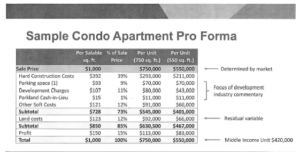A pro forma is a fundamental analysis tool used by condo developers to determine whether to proceed with a project. It involves specifying project details such as unit count, square footage, and average unit size, along with essential financial components like gross residential revenue, net residential revenue, total project revenue, project costs (including both hard and soft costs), and net profit. Ultimately, developers utilize the pro forma to gauge the potential profitability of their project through a preliminary estimate.
- When looking at purchasing a site, developers tend to work backwards to determine how much they should pay for property.
- Developers who assume higher densities in their pro forma will often pay more for a site.
- Hard costs associated with construction have escalated over last few years and municipalities have minimal control over these.
- Municipal growth related charges such as development charges and parkland dedication are used to pay for new infrastructure to support growth. Costs for the construction of municipal infrastructure has also increased in recent years.
- Other soft costs include consulting, architectural, sales commissions and similar expenses.
- Unit sale prices are determined by the market.

